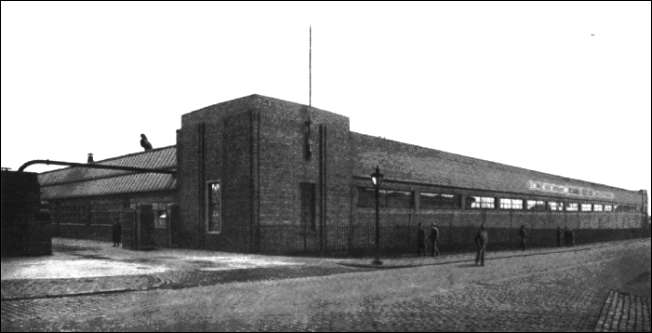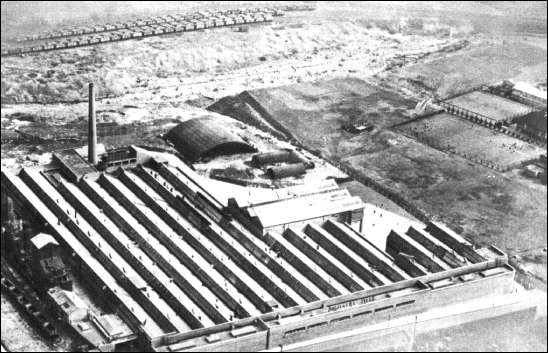|
Brownhills:
Richards
Tiles.....
To
supplement the
Pinnox works, the Brownhills Works was purpose built by
Richards
Tiles Ltd in autumn 1933 and was opened in 1934.

Richards' New Works
at Brownhills, 1937

Aerial view of
Brownhills factory
(around 1953)
"In 1933 it was realised that
the demand for Richards tiles was rapidly rising beyond the point at
which it could be satisfied from the
Pinnox Works, and it was decided to lay down an entirely new
supplementary plant. A large site having been acquired at Brownhills
- a few hundred yards from the parent establishment - building
operations were commenced in the autumn of the year mentioned, and
the new factory was opened in the summer of 1934.
Brownhills Works is one of the
best and most up-to-date tile factories in the world. For every
stage of the tile-making process it is equipped with the latest and
best machinery obtainable, no effort and no expense having been
spared to place it on the highest plane of efficiency; and it is
gratifying to be able to add that, if the new factory is a model in
this respect, it is no less admirable in the amenities it provides
for its workpeople, who perform their tasks under conditions of
comfort and hygiene little dreamed of in the industry even a decade
ago. Notwithstanding this, it would be a fundamental mistake to
regard the Brownhills Works as standing alone and the older Pinnox
plant as being relatively obsolete. The progress policy manifested
in the Brownhills venture is no new departure; it has been the
everyday life of the firm for very many years, with the result that
the Pinnox plant has been kept well abrest of the times. Thus the
same standard of quality - a standard which increased efficiency has
enabled us to keep to our traditional high level in spite of drastic
reductions in our selling prices - characterizes equally the
products of the one factory and the other."
From: "A Century of Progress
1837-1937"
a publication to commemorate The Centenary of Richards Tiles Ltd.
Richards Tiles in January 1948
The company was
operating on four sites.
1) Burslem
Mills Co. Ltd was in Federation Road, Burslem. It
supplied calcined and ground flint, ground stone (a fusible
material) and ground limestone, all in slurry form, to the tile
manufacturing units. Calcination of flint was carried out in coal
fired bottle ovens, in which alternating layers of coal and flints
were laid down. Bill Washington, who had started at Richards on
the same day as me, was later to manage this unit and go on to
manage the corresponding units at H & R Johnson.
2)
Hallfield Works was at Festing Street, Hanley. It had
been purchased from T & R Boote in 1947 and manufactured about
three thousand square yards per week of unglazed floor tile. The
manager was Len Washington (brother to Bill above). Firing was by
coal fueled bottle ovens.
3) Pinnox
Works lay between Williamson Street and Woodland
Street, Tunstall. It was divided into Bottom Works and Top
Works.
Bottom Works produced about six thousand square yards per week of
unglazed floor tile and mosaic. Firing was carried out in nine
coal fueled bottle ovens. Arthur Lea was works manager
Top Works produced twelve thousand square yards per week of glazed
wall tile and about ten thousand pieces per week of bathroom
fittings. The biscuit (first) firing was carried out in five coal
fueled bottle ovens and the glost (second) firing in four
continuous tunnel kilns. The first of these had been laid down in
1925. However, it was not until 1959 that we fired our last coal
fueled bottle oven. Ian Munroe was works manager.
4)
Brownhills Works, Brownhills Road, Tunstall was the
most modern of the units. It was built 1933/34 and manufacture
had commenced in the summer of 1934. By January 1948 production
had been lifted to twenty five thousand square yards per week.
Brownhills factory was considered to be the most efficient tile
plant in the world at that time. All firing was by tunnel kilns.
The nearly 400 foot long “A” biscuit kiln had been brought to 1170
Centigrade in 1934 and was to maintain that temperature
continuously, until repairs were made in 1954. Len Ford was works
manager.
Richards Tiles was self sufficient with its own then-very-modern
transport fleet. However, there remained a relic of a bye-gone era
in the form of horse, cart and Sam Brooks. Sam, clad in sack-bag
apron, together with horse and cart was a familiar sight, daily
plying his way between Pinnox, Brownhills, Burslem Mills and
Tunstall railway station yard. The directorate had decided that
this form of transport would continue until either Sam or his horse
was no longer fit for service. It was a sad day for Richards and
Tunstall when horse Billy had to retire.
Ken Green

|
![]()
![]()
![]()